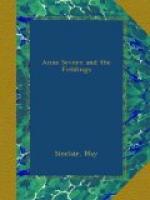The wind rose again and shook the rain curtain and blew it into the shelter. Rain scudded across the floor, wetting them where they stood. Jerrold slid the door to. They were safe now from the downpour.
Anne’s bed stood in the corner tucked up in its grey blankets. They sat down on it side by side.
For a moment they were silent, held by their memory. They were shut in there with their past. It came up to them, close and living, out of the bright, alien mystery of the rain.
He put his hand on the shoulder of Anne’s coat to feel if it was wet. At his touch she trembled.
“It hasn’t gone through, has it?”
“No,” she said and coughed again.
“Anne, I hate that cough of yours. You never had a cough before.”
“I’ve never had pleurisy before.”
“You wouldn’t have had it if you hadn’t been frightfully run down.”
“It’s all over now,” she said.
“It isn’t. You may get it again. I don’t feel as if you were safe for one minute. Are you warm?”
“Quite.”
“Are your feet wet?”
“No. No. No. Don’t worry, Jerry dear; I’m all right.”
“I wouldn’t worry if I was with you all the time. It’s not seeing you. Not knowing.”
“Don’t,” she said. “I can’t bear it.”
And they were silent again.
Their silence was more real to them than the sounding storm. There was danger in it. It drew them back and back. It was poignant and reminiscent. It came to them like the long stillness before their passion. They had waited here before, like this, through moments tense and increasing, for the supreme, toppling instant of their joy.
Their minds went round and round, looking for words to break the silence and finding none. They were held there by their danger.
At last Anne spoke.
“Do you think it’s over?”
“No. It’s only just begun.”
The rain hurled itself against the window, as if it would pluck them out into the storm. It brimmed over from the roof like water poured out from a bucket.
“We’ll have to sit tight till it stops,” he said.
Silence again, long, inveterate, dangerous. Every now and then Anne coughed, the short, hard cough that hurt and frightened him. He knew he ought to leave her; every minute increased their danger. But he couldn’t go. He felt that, after all they might have done and hadn’t done, heaven had some scheme of compensation in which it owed them this moment.
She turned from him coughing, and that sign of her weakness, the sight of her thin shoulders shaking filled him with pity that was passion itself. He thought of the injustice life had heaped on Anne’s innocence; of the cruelty that had tracked her and hunted her down; of his own complicity with her suffering. He thought of his pity for Maisie as treachery to Anne, of his honour as cowardice. Instead of piling up wall after wall, he ought never to have let anything come between him and Anne. Not even Maisie. Not even his honour. His honour belonged to Anne far more than to Maisie. The rest had been his own blundering folly, and he had no right to let Anne be punished for it.




